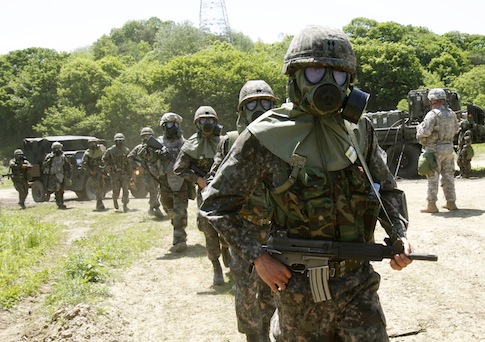Marine Corps Commandant James Amos expressed concerns Wednesday about the effect of budget cuts on the U.S. military’s preparedness for another major conflict in an increasingly dangerous world.
Amos discussed the challenges the Marine Corps and the military face in protecting a country weary from war and beset with a fiscal crisis during a talk at the Brookings Institution. He noted the civil war in Syria, instability in Iraq, the presence of al-Qaeda affiliates in Mali, and incendiary rhetoric from North Korean leader Kim Jong-un as threats the United States will need to address in the coming years.
"The world is not getting any nicer," Amos said. "I don’t see any indication in the next two decades that things will settle in and be peaceful."
He compared the current time period to the post-World War II era, when the United States dramatically reduced the size of the armed forces to focus on domestic issues. That decision left the military unprepared to fight the ensuing Cold War conflicts, he said.
"All of the sudden in 1950 we were ill-prepared in Korea," he said. "That lack of preparedness cost us dearly."
Amos said he doesn’t foresee the United States engaging in a major theatre war in the next two decades but rather dealing with "thorny, difficult, human-intensive kinds of conflicts." Still, the U.S. should be prepared to fight in a large-scale military campaign and fulfill its role as a global superpower in promoting peace and stability, he said.
"I don’t think this just becomes a small expeditionary force to go fight those little nasty conflicts," he said.
But he acknowledged that the U.S. fiscal reality poses problems for maintaining a globally responsive military. The combined cuts to the military from efficiencies found by former Secretary of Defense Robert Gates, the 2011 Budget Control Act, and sequestration total $1.2 trillion in the next decade, he said.
Amos has begun allocating those cuts to military training. Fewer than half of his forces will be combat ready by January, he said. Deployments will also be shorter and the time off for soldiers will increase, he added.
"It will be a go-to-the-war-and-come-home-when-it’s-over force," he said.
Meanwhile, Amos said he’s looking to cut administrative costs while attempting to update the Marines Corps’ equipment. He was forced to cancel the costly Expeditionary Fighting Vehicle project, which would have replaced more than 1,000 amphibious vehicles that have been in use for more than 40 years.
"We’re drawing down and we want to come back to the U.S. and reinvest in ourselves," he said. "The question is what is that balance between the reality of the world and how you live in that reality and pay your bills."
Amos has been in the military for 42 years and served in a number of roles, including as a deputy commander of NATO, before becoming the 35th commandant of the Marine Corps in 2010. Citing those years of experience, Amos said he knows threats will remain in regions where the United States decides to withdraw.
"We may think that we’re done with them," he said. "But they’re not necessarily done with us."
